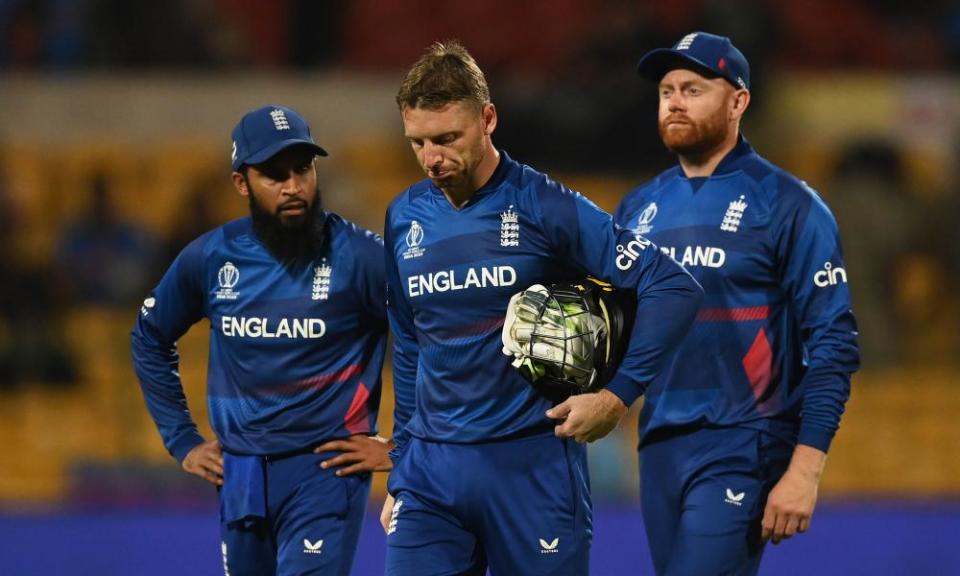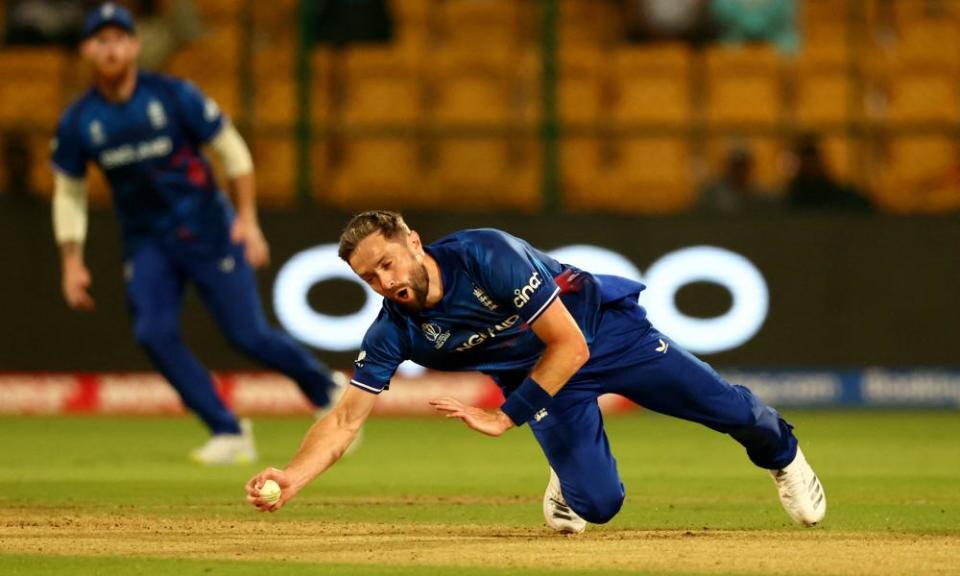Where it all went wrong for England and how they can rebuild for T20 World Cup

It is obvious now that England’s preparation for this tournament was inadequate. They may counter that it was extremely similar to South Africa’s, who are second in the table having lost only once: both teams scheduled precisely 16 ODIs in the year before the start of the World Cup and none at all for five or six months until September, when they played a home series against Antipodean opponents, gave their first-team players a short break and then travelled to India.
The difference is that eight South Africans played 10 or more of those ODIs, and only four Englishmen, two of whom have been peripheral here. The majority of their side have played together frequently, and know the intricacies and idiosyncrasies of their teammates and this format. Meanwhile some of the players England planned to rely on – Jonny Bairstow, Joe Root, Mark Wood, Ben Stokes and Liam Livingstone – had not played a 50-over game for more than a year when they turned up for the first match of September’s series against New Zealand (and Gus Atkinson had only ever played two). The assumption was that they were experienced enough to click straight into gear and stay there, but England’s assumptions have turned out not to be very reliable.
Related: Matthew Mott rejects Eoin Morgan’s claim of division in England squad
Then while England’s squad had a pre-tournament breather, Australia were playing a three-game series in India and most of the New Zealand squad was in Bangladesh. Before a major event – and this seems insultingly obvious – time with your feet on the ground is more important than time with your feet up.
A blueprint for ideal preparation is provided by India: 30 ODIs in 12 months before the World Cup, culminating in nine within three weeks in September, meaning that by the time their campaign started the rhythm of tournament cricket – play, move, train, play – was fully grooved, with the added benefit of using the Asia Cup as a low-key version of the event to come. Some of England’s players have so many other commitments this kind of schedule is all but impossible, but if you really want to win tournaments perhaps the ideal buildup is more important than the ideal teamsheet.
Matthew Mott will have had no say in this schedule, but the coach’s position will inevitably be a topic of debate. On the eve of England’s game against India Eoin Morgan, who briefly worked with Mott between the Australian’s appointment as coach and Morgan’s retirement from cricket the following month, and remains close to Jos Buttler and several members of the team, pointed the finger of blame in his direction.
“There is a line of command on the decision-making process that has failed,” Morgan said. “When it comes to infrastructure or structural decisions, you have to question the leadership. That’s a challenge for Rob Key and I’d say a bigger challenge for Matthew Mott. This World Cup and possibly the next one in the West Indies and America in 2024 will be his biggest challenges, because he’s in and amongst the team, he knows them inside out now, and his man-management will be tested because that level of expectation will not go away.”
The really interesting word here is “possibly”, an apparently harmless but deeply loaded expression of doubt, because there is only one reason why next year’s T20 World Cup would not be a challenge for Mott, and that is if he is no longer employed by the ECB. Mott’s record with Australia’s women’s team was superb, he banked plenty of credit as England won last year’s T20 World Cup, and it is only with hindsight that his decision to change almost nothing when he took over a winning team last May seems mistaken. But his good cop-good cop partnership with Jos Buttler seems at best moderately inspirational, and when tested by England’s dismal displays in India, he has had no answers. He deserves more time, but if he is able to create rather than just inherit a winning team it is time to show it.
Three steps to rebuild for the World T20:
1) Make the best of the buildup
It is too late to change England’s schedule, which is distressingly similar to the one that has worked so badly this year. Few members of this squad were expected to travel to West Indies in December – though their performances in India mean they will have some unexpected time off in November, so that could change – after which the white-ball team will be disbanded for five months. They get back together for four T20s against Pakistan in May, the last of which is five days before the start of the T20 World Cup, and it will be impossible to assemble them sooner with the Indian Premier League in full flow. Making the best of a poor buildup means changing the selection criteria, and making the present more important than the past.
2) Pick the right personnel
Jos Buttler’s defence of Chris Woakes when the bowler started this World Cup so poorly was telling. “He’s performed extremely well over a long period of time,” Buttler said, “and they’re the guys you want in your team and you keep backing them.” That approach needs to be binned: the guys you want in your team are those who are in form when you are playing them. So whoever excels in T20s this winter, in Australia’s Big Bash, South Africa’s SA20, Pakistan’s PSL or at the IPL, should be in the frame for a World Cup spot, and anyone who doesn’t should be out. And if, as seems to be the case, this group of coaches cannot eke out the best of their players, they need to be refreshed too – possible with a couple of canny appointments even with Mott remaining in charge.

3) Look to the future
England’s team is too old, and players have been too secure in their positions. The incumbents have been so heavily favoured that places in the national side seem all but unattainable to those outside it, but this is a cricket team, not a private member’s club. Unfortunately the ECB has handed out generous multi-year contracts just as they face the need for rejuvenation, but selectors have to disregard them: players must be selected on current merit, and if not under central contract they need to be rewarded for their involvement with more than just mediocre match fees. Most importantly, those who play when the multi-format players are elsewhere must be made to feel like more than placeholders. More than anything this team requires fresh faces, fresh energy and genuinely open competition for places.

